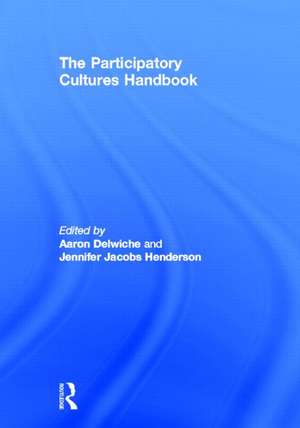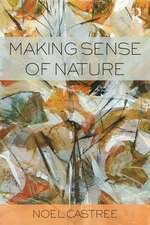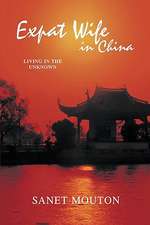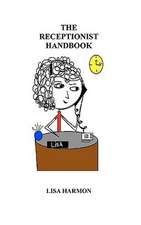The Participatory Cultures Handbook
Editat de Aaron Delwiche, Jennifer Jacobs Hendersonen Limba Engleză Hardback – 25 iul 2012
Our media landscape has undergone a seismic shift as digital technology has fostered the rise of "participatory culture," in which knowledge is originated, created, distributed, and evaluated in radically new ways. The Participatory Cultures Handbook is an indispensable, interdisciplinary guide to this rapidly changing terrain. With short, accessible essays from leading geographers, political scientists, communication theorists, game designers, activists, policy makers, physicists, and poets, this volume will introduce students to the concept of participatory culture, explain how researchers approach participatory culture studies, and provide original examples of participatory culture in action. Topics include crowdsourcing, crisis mapping, grid computing, digital activism in authoritarian countries, collaborative poetry, collective intelligence, participatory budgeting, and the relationship between video games and civic engagement.
Contributors include: Daren Brabham, Helen Burgess, Clay Calvert, Mia Consalvo, Kelly Czarnecki, David M. Faris, Dieter Fuchs, Owen Gallagher, Clive Goodinson, Alexander Halvais, Cynthia Hawkins, John Heaven, The Jannissary Collective, Henry Jenkins, Barry Joseph, Christopher Kelty, Pierre Lévy, Sophia B. Liu, Rolf Luehrs, Patrick Meier, Jason Mittell, Sarah Pearce, W. James Potter, Howard Rheingold, Suzanne Scott, Benjamin Stokes, Thomas Swiss, Paul Taylor, Will Venters, Jen Ziemke
| Toate formatele și edițiile | Preț | Express |
|---|---|---|
| Paperback (1) | 443.49 lei 6-8 săpt. | |
| Taylor & Francis – 25 iul 2012 | 443.49 lei 6-8 săpt. | |
| Hardback (1) | 1119.62 lei 6-8 săpt. | |
| Taylor & Francis – 25 iul 2012 | 1119.62 lei 6-8 săpt. |
Preț: 1119.62 lei
Preț vechi: 1365.38 lei
-18% Nou
Puncte Express: 1679
Preț estimativ în valută:
214.23€ • 224.28$ • 177.27£
214.23€ • 224.28$ • 177.27£
Carte tipărită la comandă
Livrare economică 05-19 aprilie
Preluare comenzi: 021 569.72.76
Specificații
ISBN-13: 9780415882231
ISBN-10: 0415882230
Pagini: 312
Ilustrații: 40 halftones
Dimensiuni: 178 x 254 x 19 mm
Greutate: 0.75 kg
Ediția:1
Editura: Taylor & Francis
Colecția Routledge
Locul publicării:Oxford, United Kingdom
ISBN-10: 0415882230
Pagini: 312
Ilustrații: 40 halftones
Dimensiuni: 178 x 254 x 19 mm
Greutate: 0.75 kg
Ediția:1
Editura: Taylor & Francis
Colecția Routledge
Locul publicării:Oxford, United Kingdom
Public țintă
Postgraduate and UndergraduateCuprins
I. What is Participatory Culture? 1. Introduction: What is Participatory Culture? Aaron Delwiche and Jennifer Henderson 2. The New Left and the Computer Underground: Recovering Political Antecedents of Participatory Culture Aaron Delwiche 3. From Participation to Power Christopher Kelty II. Understandng Participatory Fan Cultures 4. Wikis and Participatory Fandom Jason Mittell 5. Who's Steeing the Mothership? The Role of the Fanboy Auteur in Transmedia Storytelling Suzanne Scott 6. The Guiding Spirit and the Powers That Be: A Response to Suzanne Scott Henry Jenkins 7. A Localization Shop's Tale: Bringing an Independent Japanese Role-Playing Game to North America Mia Consalvo III. Leveraging Participatory Creativity 8. Collaborative New Media Poetry: Mixed and Remixed Thomas Swiss and Helen Burgess 9. Collaborative Comics: The Story Behind Pixton Clive Goodinson 10. The Assault on Creative Culture: The Politics of Ownership Owen Gallagher IV. Building Cultures of Knowledge 11. The Creative Conversation of Collective Intelligence Pierre Levy, translation by Phyllis Aronoff and Howard Scott 12. Blogging as a Free Frame of Reference Alexander Halavais 13. Crowdsourcing: A Model for Leveraging Online Communities Daren Brabham 14. How Particle Physicists Constructed the World's Largest Grid: A Case Study in Participatory Cultures Sarah Pearce and Will Venters V. Fostering Participatory Civic Cultures 15. Restructuring Civic Engagement: Meaningful Choice and Game Design Thinking Benjamin Stokes 16. The Future of Participatory Budgeting: Political Participation and Practicable Policy Rolf Luehr and John Heaven 17. Participatory Democracy Dieter Fuchs VI. Encouraging Participatory Activism 18. From Cultures of Participation to the Rise of Crisis Mapping in a Networked World Sophia B. Liu and Jen Zemke 19. Digital Activism in Authoritarian Countries David M. Faris and Patrick Meier 20. Activism on the Ground: Habitat for Humanity Cynthia Hawkins VII. Rethinking Education in the Age of Participatory Culture 21. Participative Pedagogy for a Literacy of Literacies Howard Rheingold 22. Leveraging Digital Media to Create a Participatory Learning Culture among Incarcerated Youth Barry Joseph and Kelly Czarnecki 23. The Expanding Role for Media Literacy in the Age of Participatory Cultures W. James Potter VIII. Challenging the Boundaries of Participatory Culture 24. Participation and the Technological Imaginary--Interactivity or Interpassivity? Paul Taylor 25. Participatory Culture and Media Life: Approaching Freedom The Jannissary Collective: Peter Blank, Watson Brown, Mark Deuze, Lindsey Ems, Nicky Lewis, Jenna McWilliams, and Laura Speers 26. Legal Constraints on Participatory Culture in the United States: Anonymity, Concealment and Revelation Clay Calvert 27. Toward an Ethical Framework for Online Participatory Cultures Jennifer Henderson
Notă biografică
Aaron Delwiche is an associate pofessor in the Department of Communication at Trinity University in San Antonio, Texas. He teaches courses on hacking subcultures, transmedia storytelling and video-game design and criticism. His experiments with games in the classroom have been covered by publications ranging from Wired to The Guardian (UK). In 2009, with support from the Lennox Foundation, he organized the lecture series "reality Hackers: The Next Wave of Media Revolutionaries"and published an anthology of essays related to the series.
Jennifer Jacobs Henderson is an associate professor and chair of the Department of Communication at Trinity University in San Antonio, Texas. Dr. Henderson is the author of the 2010 book Defending the Good News: The Jehovah’s Witnesses and Their Plan to Expand the First Amendment. She specializes in issues of media law, the ethics of media, and the use of participatory cultures for political and social action. For more than a decade, she has been researching how voices outside of American mainstream discourse have pressured the government to expand free speech protections.
Jennifer Jacobs Henderson is an associate professor and chair of the Department of Communication at Trinity University in San Antonio, Texas. Dr. Henderson is the author of the 2010 book Defending the Good News: The Jehovah’s Witnesses and Their Plan to Expand the First Amendment. She specializes in issues of media law, the ethics of media, and the use of participatory cultures for political and social action. For more than a decade, she has been researching how voices outside of American mainstream discourse have pressured the government to expand free speech protections.
Recenzii
"From gaming to education, journalism, and criticism, this ambitious and exciting book covers the full gamut of the participatory culture world. An essential and very useful collection for anyone even remotely interested in the topic." —Bryan Alexander, Senior Fellow, National Institute for Technology in Liberal Education
"From gaming to education, journalism, and criticism, this ambitious and exciting book covers the full gamut of the participatory culture world. An essential and very useful collection for anyone even remotely interested in the topic." —Bryan Alexander, Senior Fellow, National Institute for Technology in Liberal Education
"Recommended. [A] solid entrée into deeper thinking about participatory culture." –CHOICE, B.S. John, Old Dominion University
"From gaming to education, journalism, and criticism, this ambitious and exciting book covers the full gamut of the participatory culture world. An essential and very useful collection for anyone even remotely interested in the topic." —Bryan Alexander, Senior Fellow, National Institute for Technology in Liberal Education
"Recommended. [A] solid entrée into deeper thinking about participatory culture." –CHOICE, B.S. John, Old Dominion University
Descriere
How did we get from Hollywood to YouTube? What makes Wikipedia so different from a traditional encyclopedia? Has blogging dismantled journalism as we know it?
Our media landscape has undergone a seismic shift as digital technology has fostered the rise of "participatory culture," in which knowledge is originated, created, distributed, and evaluated in radically new ways. The Participatory Cultures Handbook is an indispensable, interdisciplinary guide to this rapidly changing terrain. With short, accessible essays from leading geographers, political scientists, communication theorists, game designers, activists, policy makers, physicists, and poets, this volume will introduce students to the concept of participatory culture, explain how researchers approach participatory culture studies, and provide original examples of participatory culture in action. Topics include crowdsourcing, crisis mapping, grid computing, digital activism in authoritarian countries, collaborative poetry, collective intelligence, participatory budgeting, and the relationship between video games and civic engagement.
Our media landscape has undergone a seismic shift as digital technology has fostered the rise of "participatory culture," in which knowledge is originated, created, distributed, and evaluated in radically new ways. The Participatory Cultures Handbook is an indispensable, interdisciplinary guide to this rapidly changing terrain. With short, accessible essays from leading geographers, political scientists, communication theorists, game designers, activists, policy makers, physicists, and poets, this volume will introduce students to the concept of participatory culture, explain how researchers approach participatory culture studies, and provide original examples of participatory culture in action. Topics include crowdsourcing, crisis mapping, grid computing, digital activism in authoritarian countries, collaborative poetry, collective intelligence, participatory budgeting, and the relationship between video games and civic engagement.


















